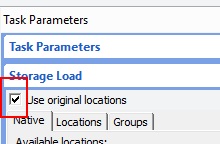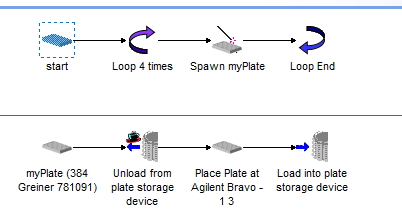Another possibility is to use this trick:
- first create a “location group” (in my case it is called “reservoirA”)
- In the “unload” task of your protocol add this code (in the code below I am supposed to reuse my “reservoirA” location 4 times):
unloadArr = [];
if (plate.instance === 1) {
for (i=0; i<4; i++) unloadArr.push("reservoirA");
task.unloadFrom = unloadArr;
}
- Check this box in the load task:

- check this box in the protocol options:

- Run your protocol (just a test protocol):

- The Gantt chart shows that 4 plates were unloaded always from the same slot/cassette and placed back:
The bottom line is: you can use the same location on the Minihub multiple times if you populate task.unloadFrom with an array containing as many “location group” names as many unload/load instances you need to generate.
Finally, I would like to share a few lines from an old “PlateHub” manual which also apply to the MiniHub:
-
task.unloadfrom for Unload task: it expects an array of strings of either location group or plate group.
e.g. task.unloadfrom = [“Cassette1”, “PlateGroup1”] -
task.loadintoByLocation for Load task: it expects an array of strings of location group.
e.g. task.loadintoByLocation = [“Cassette1”, “Cassette2”] -
task.loadintoByGroup for Load task: it expects an array of strings of plate group.
e.g. task.loadintoByGroup = [“PlateGroup1”, “PlateGroup2”]
Note: task.unloadfrom, task.loadintoByLocation, and task.loadintoByGroup should only be called once for the first plate in the batch because these functions re-construct the plate groups internally, and reset the plate pointer to the first plate.
e,g. if (plate.instance === 1) task.unloadfrom = [“Cassette1”];

